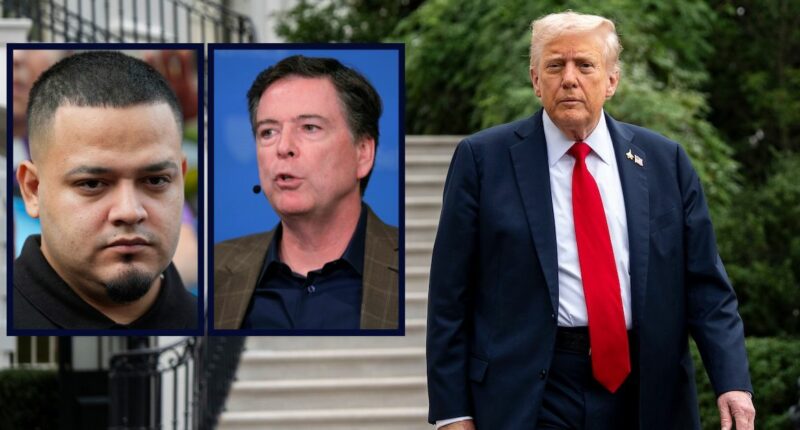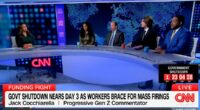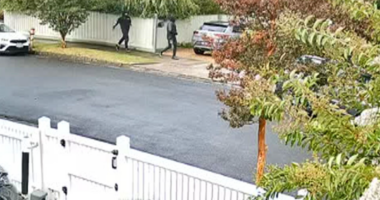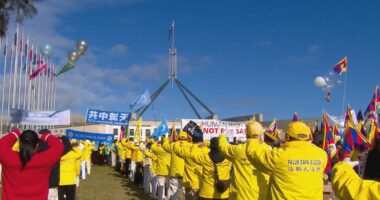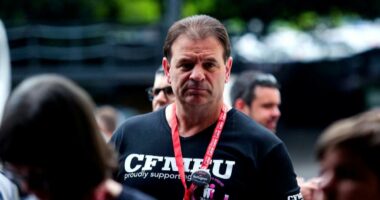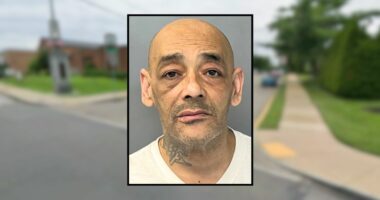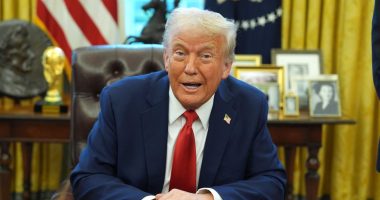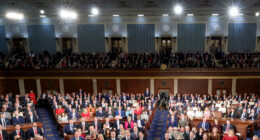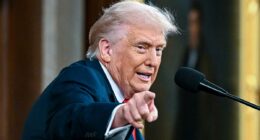Share this @internewscast.com
Left inset: Kilmar Abrego Garcia joins a protest rally at the Immigration and Customs Enforcement field office in Baltimore, Monday, Aug. 25, 2025 (AP Photo/Stephanie Scarbrough). Right inset: Ex-Director of the Federal Bureau of Investigation James Comey makes a gesture while speaking at Harvard University’s Institute of Politics’ JFK Jr. Forum in Cambridge, Mass., Monday, Feb. 24, 2020 (AP Photo/Charles Krupa). Main: President Donald Trump approaches the press before leaving on Marine One from the South Lawn of the White House, Tuesday, Sept. 30, 2025, in Washington (AP Photo/Alex Brandon).
A federal judge ruled Friday that there exists a “realistic likelihood of vindictiveness” concerning federal charges against Kilmar Abrego Garcia, allowing the wrongly deported individual to receive an evidentiary hearing on allegations that the Trump administration is penalizing him for causing “embarrassment” to the government — a legal maneuver that former FBI Director James Comey might observe with interest.
Abrego Garcia faced deportation from Maryland in March and was detained in El Salvador at the Terrorism Confinement Center (CECOT). The Trump administration later conceded that the deportation was due to an “administrative error” and was directed to “facilitate” his return. His return was executed in June, following the initiation of a federal indictment in Tennessee on human smuggling charges, purportedly linked to a 2022 traffic incident.
From the beginning, Abrego Garcia’s defense team claimed the charges were retaliatory, a response to their client’s lawsuit contesting his deportation from Maryland to El Salvador. This legal action compelled the government, which labeled him as “a known MS-13 gang member, human trafficker, and serial domestic abuser” upon his return to the U.S., to nonetheless acknowledge its mistake.
U.S. District Judge Waverly Crenshaw indicated in his opinion that the defendant will be granted the chance to scrutinize these assertions, which are often challenging to substantiate, in court.
Crenshaw, appointed by Barack Obama, remarked that the “combination of events provides sufficient evidentiary support to infer that there is a ‘realistic likelihood of vindictiveness,’ thus entitling Abrego to discovery and necessitating an evidentiary hearing before the Court adjudicates his motion.”
Factoring into the decision were comments by Deputy Attorney General Todd Blanche, President Donald Trump’s former criminal defense lawyer, on Fox News in June, apparently linking the prosecution to the consequences of Abrego Garcia’s lawsuit.
“To remove any doubt, Deputy Attorney General Blanche said that the criminal case was brought to return Abrego to the United States, ‘not [because of] a Judge,’ but instead, because of ‘an arrest warrant issued by a grand jury in the Middle District of Tennessee,'” the judge wrote. “This could be direct evidence of vindictiveness.”
Calling Blanche’s words “remarkable,” and citing to a case that said an “actual confession by the prosecutor” is the “clearest” way to show a vindictive prosecution, Crenshaw said the “statements could directly establish that the motivations for Abrego’s criminal charges stem from his exercise of his constitutional and statutory rights to bring suit against the Executive Official Defendants, rather than a genuine desire to prosecute him for alleged criminal misconduct.”
As a result, Abrego Garcia’s lawyers were granted a discovery and a hearing, as the judge noted the “embarrassment” the defendant has caused to the executive branch of government:
The Executive Branch invested time, resources, and international coordination with El Salvador to remove Abrego from the United States. All of this occurred notwithstanding an order forbidding his removal to El Salvador. Abrego’s successful challenge, and the federal injunction he obtained, meant that the Executive’s time, resources, and international coordination with El Salvador was a waste. The Executive Branch now must start anew if it seeks to remove Abrego again. This has created a significant burden on and embarrassment to the Executive Branch, that must now expend additional time, resources, and international goodwill to remove Abrego to El Salvador or elsewhere. Even more telling is the injunction to facilitate his return to Maryland created both national and international burdens on the Government, and more specifically, on the Executive Official Defendants.
Abrego Garcia’s insistence that there be a hearing on his vindictive prosecution claims was the same ask that Trump had at one point in his Mar-a-Lago classified documents criminal prosecution, a case that would later be dismissed on unrelated grounds.
Hunter Biden likewise pursued this line of argument, but without success, before his father, then-President Joe Biden, pardoned him for his crimes.
And a legal strategy centered on the government’s motivations might also be of interest to James Comey, as a possible “roadmap” for eventually dismissing his false statement and obstruction indictment in the Eastern District of Virginia on vindictive prosecution grounds.
There, the “totality of events” includes that Trump appears to have removed ex-EDVA U.S. Attorney Erik Siebert for questioning the strength of the evidence against Comey and for refusing to bring a mortgage fraud case against Democratic New York Attorney General Letitia James.
Trump responded by replacing Siebert with his former Mar-a-Lago case lawyer Lindsey Halligan, who had never previously prosecuted a case, and openly demanded in a social media post that U.S. Attorney General Pam Bondi prosecute his rivals, including his longtime Russia probe foe Comey, seemingly worried that not doing so was harming the administration’s “credibility” and causing embarrassment.
“We can’t delay any longer, it’s killing our reputation and credibility. They impeached me twice, and indicted me (5 times!), OVER NOTHING. JUSTICE MUST BE SERVED, NOW!!! President DJT,” the Sept. 20 post said.
Time was of the essence because the statute of limitations on the alleged Sept. 30, 2020, offense was set to expire at the end of the month, and Halligan got the Comey indictment the president wanted, even as reports swirled that DOJ higher-ups, and certain conservative legal commentators, had their doubts about the case.
In the aftermath of the indictment, the president took a victory lap, calling Comey a “Dirty Cop” and a “destroyer of lives” who had to pay “a very big price” for a “very serious and far reaching lie[.]”
